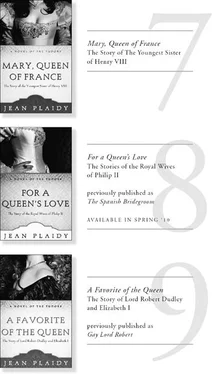Jean Plaidy - The Murder in the Tower - The Story of Frances, Countess of Essex
Здесь есть возможность читать онлайн «Jean Plaidy - The Murder in the Tower - The Story of Frances, Countess of Essex» весь текст электронной книги совершенно бесплатно (целиком полную версию без сокращений). В некоторых случаях можно слушать аудио, скачать через торрент в формате fb2 и присутствует краткое содержание. Жанр: Старинная литература, на русском языке. Описание произведения, (предисловие) а так же отзывы посетителей доступны на портале библиотеки ЛибКат.
- Название:The Murder in the Tower: The Story of Frances, Countess of Essex
- Автор:
- Жанр:
- Год:неизвестен
- ISBN:нет данных
- Рейтинг книги:3 / 5. Голосов: 1
-
Избранное:Добавить в избранное
- Отзывы:
-
Ваша оценка:
- 60
- 1
- 2
- 3
- 4
- 5
The Murder in the Tower: The Story of Frances, Countess of Essex: краткое содержание, описание и аннотация
Предлагаем к чтению аннотацию, описание, краткое содержание или предисловие (зависит от того, что написал сам автор книги «The Murder in the Tower: The Story of Frances, Countess of Essex»). Если вы не нашли необходимую информацию о книге — напишите в комментариях, мы постараемся отыскать её.
The Murder in the Tower: The Story of Frances, Countess of Essex — читать онлайн бесплатно полную книгу (весь текст) целиком
Ниже представлен текст книги, разбитый по страницам. Система сохранения места последней прочитанной страницы, позволяет с удобством читать онлайн бесплатно книгу «The Murder in the Tower: The Story of Frances, Countess of Essex», без необходимости каждый раз заново искать на чём Вы остановились. Поставьте закладку, и сможете в любой момент перейти на страницу, на которой закончили чтение.
Интервал:
Закладка:
She was restless and unhappy but less so than she had been at Chartley.
And at last Essex agreed that they should return to Court.
THE ENEMIES
T he marriage of the Princess Elizabeth to the Elector Palatine had been delayed on account of the mourning for the Prince of Wales. Henry had died in November and the wedding did not take place until February, which meant that the Elector and his retinue had to be housed and entertained during that period at a great cost to the royal exchequer. James reckoned that his daughter’s marriage had cost him almost a hundred thousand pounds.
His courtiers had vied with each other to be the most splendidly attired at Court, and James had insisted that his dear Robbie should shine more brightly than any because that was only due to his beauty. Therefore he lavished costly jewels on his favorite; and while his affection was strongest for Robert Carr, he did not forget his other lads, who were handsome enough to show off fine clothes and jewels.
There was the Queen who, although she was prostrate with grief and in any case was not pleased with the marriage of her daughter, still must be expensively clad; and the cost of her wardrobe was only a little less than the six thousand pounds which had been spent on Elizabeth’s wedding clothes and trousseau.
As for James himself, he must remember that he was the King and in the presence of foreigners should make a good show; he was ready to do this as long as his garments were as well padded as they were bejeweled and he was not expected to wash.
So Elizabeth was married in Whitehall Chapel and looked beautiful in her white dress, her golden hair falling about her shoulders, with a crown of pearls and diamonds set on her head. She was led to the chapel by Charles—now growing handsome and with the new dignity upon him of being heir to the throne—and Henry Howard, Earl of Northampton. The Queen had wept quietly while the Archbishop of Canterbury performed the ceremony; and James knew that she was thinking of losing her daughter to a foreigner as she had lost her son to death.
The celebrations which followed the wedding must necessarily be somewhat subdued because although it was three months since Henry’s death he could not be easily forgotten.
It was Robert Carr who suggested that the farewell banquet should be held at his own castle at Rochester; and the King, delighted to see his dear Robbie host to the Court, gladly agreed.

The last farewells had been said and Elizabeth had sailed away from England to her new home, while the Court returned to Rochester Castle to be entertained a few days longer by Viscount Rochester before returning to Whitehall.
The castle which stood on the banks of the Medway was a splendid example of Norman architecture; it had clearly been built as a fortress, situated as it was on a hill with its principal tower offering views of the country and river. Robert Carr was proud to possess it, for it had been the scene of many a historic occasion since it had been built in the year 1088 by the Norman monk Gundulph, who had been Bishop of Rochester and a celebrated architect. It was an ideal place in which to house the Court and that he could do so was an indication of how quickly he had risen since the death of Salisbury.
Robert was being dressed by his servants in his own apartments when the man whom he had come to regard as one of his greatest friends and supporters asked to be admitted.
This was Henry Howard, Earl of Northampton, who had assiduously courted the favorite since he had realized the firmness of his hold on the King’s affections.
“Ah,” cried the wily old statesman, “I disturb you.”
“Nay,” cried Robert. “I am all but ready.”
By God, thought Northampton, he is a handsome fellow; and he looks as fresh and young as he did the day he rode into the tiltyard and so cleverly fell from his horse.
“Pray be seated,” said Robert. “I shall be ready to go to the banqueting hall in five minutes or so.”
“Then we will go together,” said Northampton.
It was well to be seen with the favorite; it reminded his enemies that he had friends in the right quarter. Robert, good-natured and easy going, never bothered to ask himself why a haughty Howard should be so anxious for his friendship and when Overbury said: “Why, Henry Howard would not speak to you tomorrow if you lost the King’s favor!” Robert replied: “Why should he?” and left it at that, which meant that while Northampton offered his friendship, Robert Carr was ready to accept it.
Robert dismissed his servants, which was only courteous because he guessed that Northampton did not wish them to overhear their conversation, and since they were both ministers of eminence it was certain that some state matter would be discussed between them sooner or later. Since he had become a Privy Councillor Robert had been aware of the need to watch his tongue before servants.
When they were alone Northampton asked Robert if he knew whether a certain gentleman had been called upon to sign the Oath of Supremacy.
As Robert was able to assure him that this man had not been asked to do so, Northampton was relieved. It was pleasant to be able to ask such a question privately. Northampton was a little worried because he, being a secret Catholic, had no wish to be asked to sign the Oath; and he feared that if the man in question had had such a demand made to him, the invitation to sign might well be extended to himself, Northampton.
The signing of this Oath was a scheme which James had thought up when he was so short of money. It was his plan to force Catholics to sign it and if they refused, to subject them to heavy fines or imprisonment. As the Pope had ordered Catholics not to sign the Oath because it contained sentences which were derogatory to the Catholic Faith, to have signed it would have been a denial of faith. Many Catholics had refused and consequently lost their possessions, which was exactly what James had hoped, since it was to raise money that he had thought of the plan.
Robert had not cared for this scheme because he thought it was wrong to penalize people on account of their religion, and would have preferred to see Catholics living in peace beside Protestants.
It was sometimes, however, his duty to write to Catholics ordering them to take the Oath, and this he did because he always obeyed the King; but he never brought a Catholic to the King’s notice, and did nothing, except when expressly ordered to do so by James, to enforce this unpleasant law.
At the same time he never implied to James that he disapproved of it. It was alien to his nature to offer criticism; he was well aware that if he did so James would demolish this in a moment with some tricky argument; and he knew that James continued to love his Robbie because he was never what the King called a cantankerous body.
Northampton was aware of this quality in Carr and he knew that he could safely ask for information about the penalizing of recusants. If he, Northampton, had been asked to sign the Oath, he supposed he would have signed it; his political career would always mean more to him than any religious faith; but he preferred not to have to make the decision; and thus it was very comforting to have a friend in Robert Carr.
Northampton decided that he was in no danger and went on:
“I have taken a liberty with your hospitality, and I trust you will not think I have presumed on your friendship.”
Robert smiled his charming smile and said: “My dear Northampton, it gives me pleasure that you should presume on my friendship. It shows that you are sure of it.”
Читать дальшеИнтервал:
Закладка:
Похожие книги на «The Murder in the Tower: The Story of Frances, Countess of Essex»
Представляем Вашему вниманию похожие книги на «The Murder in the Tower: The Story of Frances, Countess of Essex» списком для выбора. Мы отобрали схожую по названию и смыслу литературу в надежде предоставить читателям больше вариантов отыскать новые, интересные, ещё непрочитанные произведения.
Обсуждение, отзывы о книге «The Murder in the Tower: The Story of Frances, Countess of Essex» и просто собственные мнения читателей. Оставьте ваши комментарии, напишите, что Вы думаете о произведении, его смысле или главных героях. Укажите что конкретно понравилось, а что нет, и почему Вы так считаете.











